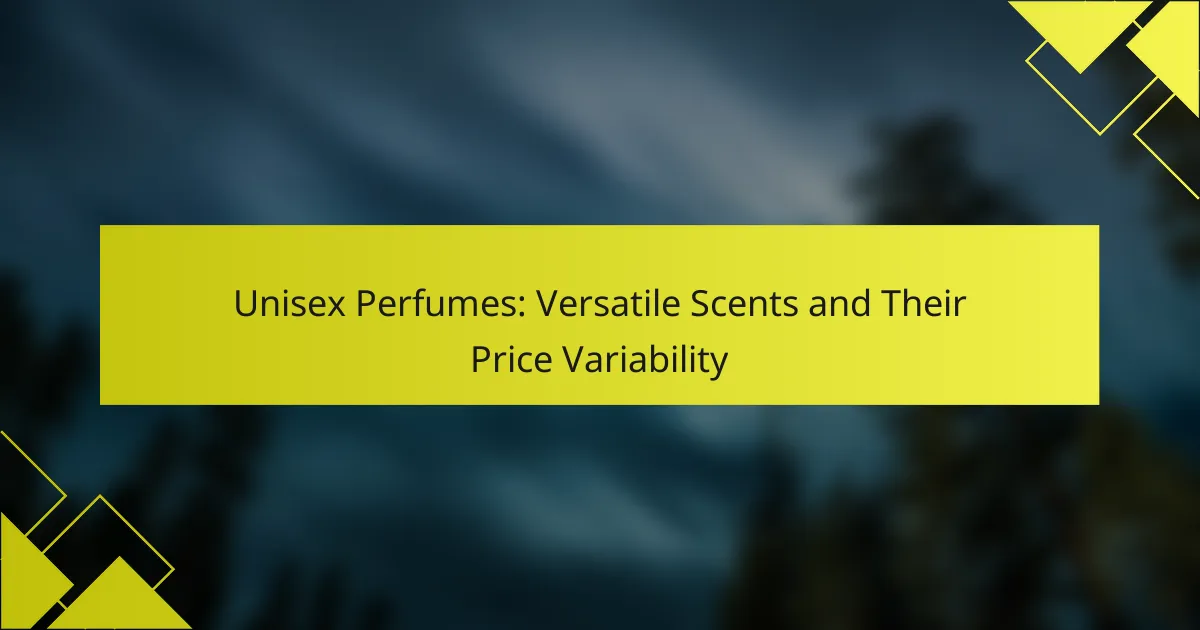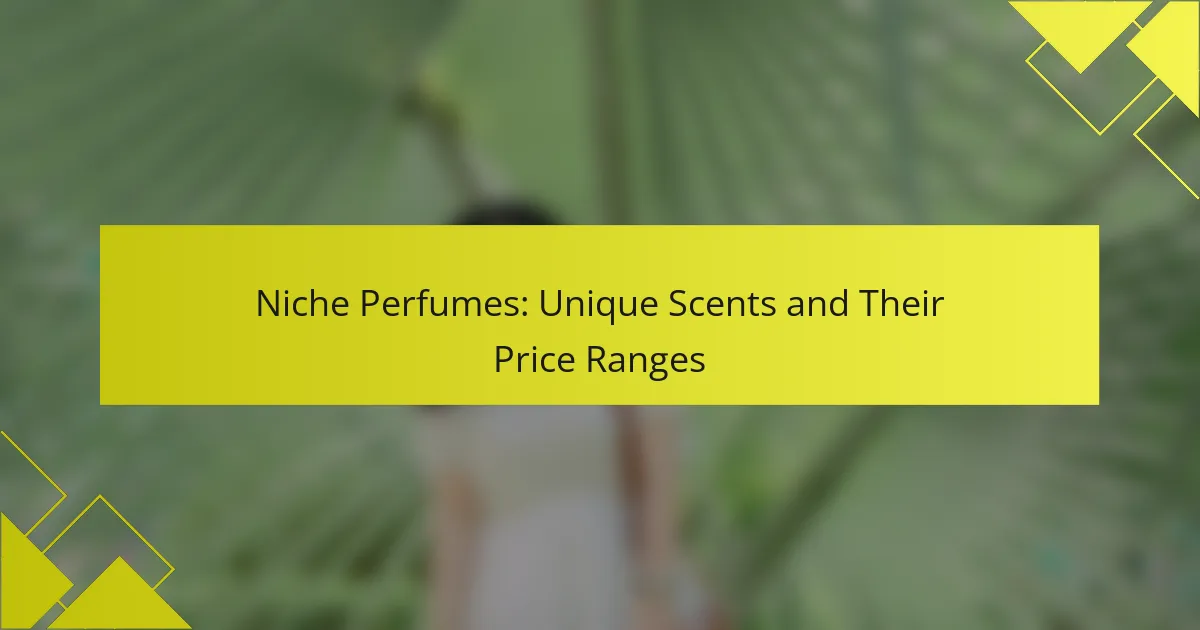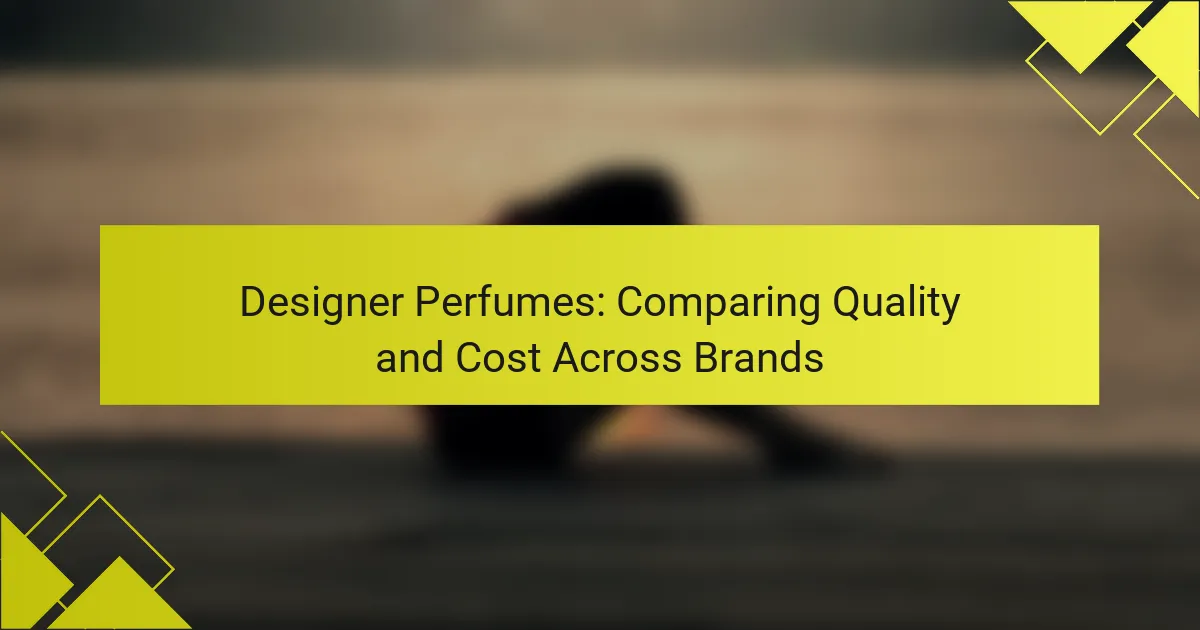
What are High-End Perfumes?
High-end perfumes are luxury fragrances crafted with high-quality ingredients. They often contain a higher concentration of essential oils compared to mass-market perfumes. This concentration results in a richer and more complex scent profile. High-end perfumes typically feature unique and rare ingredients, enhancing their exclusivity. Brands often invest in artisanal production methods, ensuring meticulous attention to detail. The packaging of high-end perfumes is also designed to reflect luxury and elegance. Many high-end perfumes are produced in limited quantities, adding to their desirability. The price of high-end perfumes can range significantly due to these factors, often exceeding $100 for a bottle.
How do High-End Perfumes differ from regular perfumes?
High-end perfumes differ from regular perfumes primarily in their concentration of fragrance oils. High-end perfumes typically contain a higher percentage of essential oils, often ranging from 20% to 40%. This results in a richer, more complex scent profile. Regular perfumes usually have lower concentrations, around 10% to 20%.
The longevity of high-end perfumes is also superior, lasting up to 12 hours or more. In contrast, regular perfumes may last only 4 to 6 hours. Additionally, high-end brands often use rare and high-quality ingredients, which enhances the overall fragrance experience.
The packaging of high-end perfumes is also more luxurious, often featuring intricate designs and high-quality materials. This attention to detail reflects the brand’s commitment to quality. Overall, high-end perfumes offer a more sophisticated and lasting scent experience compared to regular perfumes.
What ingredients contribute to the quality of High-End Perfumes?
High-end perfumes are characterized by high-quality ingredients. Natural essential oils are often used, providing depth and complexity. Rare floral extracts, such as jasmine or rose, enhance the fragrance profile. Resins like frankincense and myrrh add richness and longevity. High-end perfumes may also include synthetic compounds that mimic rare scents. These compounds can enhance stability and projection. Alcohol content in high-end perfumes is carefully balanced for optimal diffusion. The quality of ingredients directly influences the overall scent experience and longevity.
How is the manufacturing process of High-End Perfumes unique?
The manufacturing process of high-end perfumes is unique due to its meticulous craftsmanship and use of rare ingredients. Artisans often create these fragrances in small batches, ensuring quality and attention to detail. The process begins with sourcing high-quality raw materials, which can include rare flowers, spices, and essential oils. These ingredients are often harvested at specific times to capture their peak fragrance.
High-end perfumes utilize traditional methods such as enfleurage and distillation, which are labor-intensive and time-consuming. This contrasts with mass-produced fragrances that rely on synthetic compounds and automated processes. The blending of these natural ingredients requires a perfumer’s expertise to achieve a harmonious balance.
Moreover, high-end perfumes often undergo extensive aging, allowing the scent to mature and develop complexity. This aging process can take months or even years. The final product is usually presented in exquisite packaging, reflecting the luxury of the fragrance itself. Each bottle often becomes a work of art, emphasizing the uniqueness of the perfume. These factors collectively contribute to the distinctiveness of high-end perfume manufacturing.
Why are High-End Perfumes considered a luxury item?
High-end perfumes are considered luxury items due to their exclusive ingredients and craftsmanship. These fragrances often use rare and high-quality materials, such as natural essences and essential oils. The production process involves skilled artisans who meticulously create each scent. Many high-end brands also invest in unique bottle designs, enhancing the overall aesthetic appeal. Additionally, high-end perfumes typically come with a higher price tag, reflecting their premium status. Limited editions and collaborations further elevate their exclusivity. The marketing and branding strategies employed by luxury perfume houses reinforce their image as status symbols. Overall, the combination of quality, craftsmanship, and exclusivity solidifies high-end perfumes as luxury items.
What factors contribute to the pricing of High-End Perfumes?
The pricing of high-end perfumes is influenced by several key factors. Ingredient quality plays a significant role; rare and natural ingredients often increase costs. Brand reputation also affects pricing; established luxury brands command higher prices due to their prestige. Packaging and design contribute to overall costs; intricate bottles and elegant designs add value. Production methods can impact price; artisanal and small-batch production typically incurs higher expenses. Marketing and advertising expenses are significant; luxury brands invest heavily to create an exclusive image. Limited editions or unique scents can command premium prices; scarcity often drives demand. Finally, retail markups influence the final price; luxury retailers may add significant margins.
How does branding influence the perception of High-End Perfumes?
Branding significantly influences the perception of high-end perfumes. Strong branding creates an image of luxury and exclusivity. Consumers often associate well-known brands with higher quality. This perception can lead to a willingness to pay premium prices. For instance, brands like Chanel and Dior are recognized for their sophisticated marketing. Their packaging, advertising, and celebrity endorsements enhance desirability. Studies show that consumers perceive branded perfumes as more effective and long-lasting. Additionally, storytelling in branding connects emotionally with consumers, further enhancing perceived value.
What are the benefits of investing in High-End Perfumes?
Investing in high-end perfumes offers various benefits. High-end perfumes typically contain higher concentrations of fragrance oils, resulting in longer-lasting scents. These perfumes often use premium ingredients, which enhances their overall quality and complexity. The craftsmanship involved in creating these fragrances is usually superior, leading to unique scent profiles. High-end brands often emphasize sustainability and ethical sourcing of ingredients, appealing to environmentally conscious consumers. Additionally, owning luxury perfumes can be seen as a status symbol, reflecting personal style and sophistication. The packaging of high-end perfumes is often exquisite, making them ideal for gifting or display. Overall, investing in high-end perfumes can elevate personal experiences and enhance one’s signature scent.
How do High-End Perfumes enhance personal identity and style?
High-end perfumes enhance personal identity and style by creating a unique olfactory signature. This signature allows individuals to express their personality and mood through scent. High-end fragrances often contain rare and high-quality ingredients, which contribute to their distinctiveness. The complexity of these perfumes can evoke emotions and memories, reinforcing personal connections. Additionally, wearing a luxury fragrance can boost confidence and self-esteem. Studies show that scent can influence perceptions of attractiveness and social status. Thus, high-end perfumes serve as a powerful tool for personal branding and self-expression.
What long-term value can High-End Perfumes provide?
High-end perfumes provide lasting quality and distinctive scents that can enhance personal identity. These fragrances often use premium ingredients, ensuring longevity on the skin. The craftsmanship involved in creating high-end perfumes results in unique olfactory experiences. Many high-end perfumes maintain their value over time, making them collectible items. According to a 2018 report by Statista, luxury fragrance sales reached approximately $10 billion globally. This indicates a strong market demand for high-quality scents. Additionally, high-end perfumes can evoke emotions and memories, contributing to their long-term value.
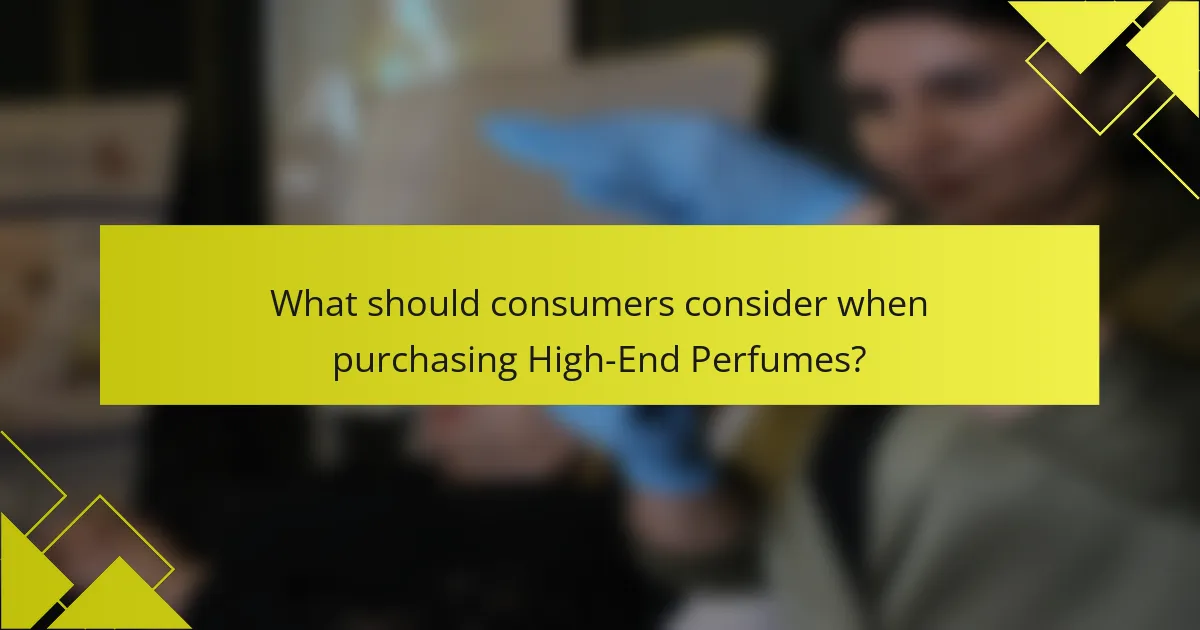
What should consumers consider when purchasing High-End Perfumes?
Consumers should consider the fragrance notes when purchasing high-end perfumes. The composition includes top, middle, and base notes. Top notes create the first impression and evaporate quickly. Middle notes develop after the top notes fade. Base notes provide lasting depth and richness.
The concentration level is also crucial. Higher concentrations, like parfum, tend to last longer than eau de toilette. Packaging quality can reflect the brand’s luxury status. A beautifully designed bottle often enhances the overall experience.
Brand reputation plays a significant role in consumer trust. Established brands often guarantee quality and exclusivity. Price is another factor; high-end perfumes typically range from $100 to several hundred dollars.
Testing the perfume before purchasing is essential. Sampling allows consumers to experience the scent on their skin. Personal skin chemistry can alter how a fragrance smells. Therefore, what works for one person may not work for another.
Lastly, consumers should consider the occasion for the fragrance. Some scents are more suited for daytime wear, while others are better for evening events.
How can one choose the right High-End Perfume?
To choose the right high-end perfume, consider your personal scent preferences. Identify fragrance families such as floral, oriental, woody, or fresh. Test various scents on your skin, as they can change based on body chemistry. Evaluate the longevity and sillage, which indicate how long the fragrance lasts and how far it projects. Research the brand’s reputation and ingredient quality, as high-end perfumes often use rare materials. Read reviews and seek recommendations from fragrance experts or enthusiasts. Sampling before purchasing can help ensure satisfaction. Remember, the right perfume should evoke positive emotions and align with your style.
What are the different fragrance families in High-End Perfumes?
The different fragrance families in high-end perfumes include floral, oriental, woody, fresh, and citrus. Floral fragrances are characterized by the scent of flowers and are often romantic. Oriental fragrances combine spices, resins, and exotic notes, creating a warm and sensual aroma. Woody fragrances feature notes from trees and plants, providing a rich and earthy scent. Fresh fragrances are light and invigorating, often including green and aquatic notes. Citrus fragrances are bright and zesty, dominated by lemon, orange, and other citrus fruits. Each family offers a unique olfactory experience, appealing to various preferences and occasions.
How does skin chemistry affect the scent of High-End Perfumes?
Skin chemistry significantly influences how high-end perfumes smell on an individual. Each person’s skin has a unique pH level, moisture content, and temperature. These factors interact with the fragrance compounds in perfumes. For example, acidic skin may amplify certain notes while neutral skin may not. Additionally, skin oils can alter the volatility of fragrance molecules. This means that the same perfume can smell different on different people. Studies show that body chemistry can enhance or diminish specific scent notes. Therefore, testing a fragrance on the skin is essential for an accurate scent assessment.
What are common misconceptions about High-End Perfumes?
High-end perfumes are often misunderstood in several ways. One common misconception is that they are only about luxury branding. In reality, high-end perfumes typically feature superior ingredients and craftsmanship. Another misconception is that all expensive perfumes last longer than cheaper alternatives. Longevity depends on the formulation and concentration, not just the price. People also believe that high-end perfumes are only for special occasions. Many can be worn daily, enhancing personal expression. Additionally, some think that the scent will smell the same on everyone. Individual body chemistry can alter how a fragrance is perceived. Lastly, there is a belief that high-end perfumes are not worth the investment. However, many users find that quality fragrances provide a unique experience and satisfaction that lower-priced options may lack.
Is a higher price always indicative of better quality?
No, a higher price is not always indicative of better quality. While many high-end perfumes use premium ingredients and craftsmanship, price does not guarantee superior scent or longevity. Some lower-priced perfumes offer comparable quality due to effective marketing or brand positioning. Consumer reviews and expert evaluations often reveal that price does not correlate directly with satisfaction. For instance, a study by the Journal of Consumer Research found that perceived quality can be influenced by branding rather than cost alone. Therefore, it is essential to assess individual products rather than rely solely on price as a measure of quality.
Do High-End Perfumes last longer than cheaper alternatives?
High-end perfumes generally last longer than cheaper alternatives. This is primarily due to the concentration of fragrance oils in high-end products. High-quality perfumes often contain 20-30% fragrance oil, while cheaper alternatives may contain only 5-15%. The higher concentration leads to a more potent scent that lasts longer on the skin. Additionally, high-end brands invest in better ingredients and formulations, enhancing longevity. Studies indicate that premium perfumes can last up to 8 hours or more, while budget options may fade within 3-5 hours.
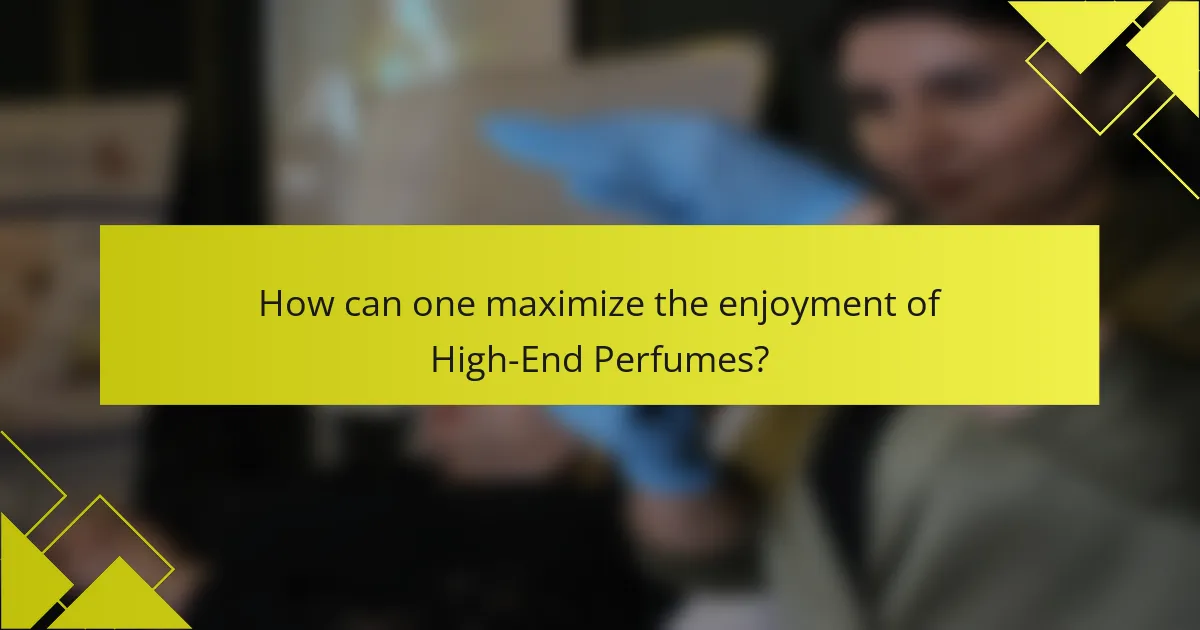
How can one maximize the enjoyment of High-End Perfumes?
To maximize the enjoyment of high-end perfumes, one should apply them strategically. Spraying on pulse points enhances fragrance projection. These areas include the wrists, neck, and behind the ears. Layering scents with matching body lotions can deepen the aroma experience. Storing perfumes away from light and heat preserves their integrity. Testing fragrances before purchase ensures personal preference alignment. Sampling scents on skin rather than paper helps assess true scent evolution. Additionally, avoiding overspraying maintains a subtle allure. These practices enhance the overall enjoyment and longevity of high-end perfumes.
What are the best practices for applying High-End Perfumes?
The best practices for applying high-end perfumes include applying them to pulse points. These areas include the wrists, neck, and behind the ears. Pulse points generate heat, which helps to diffuse the fragrance and enhance its scent.
Another best practice is to apply perfume on moisturized skin. Fragrance lasts longer on hydrated skin compared to dry skin. Additionally, it’s advised to avoid rubbing the wrists together after application. Rubbing can break down the fragrance molecules and alter the scent.
Spraying from a distance of about 6 to 8 inches is also recommended. This distance allows for a more even distribution of the fragrance. Lastly, layering products, such as using scented body lotion, can enhance the overall scent experience.
These practices help to maximize the longevity and impact of high-end perfumes.
How can one store High-End Perfumes to maintain their integrity?
Store high-end perfumes in a cool, dark place to maintain their integrity. Avoid exposure to direct sunlight, as UV rays can alter the fragrance. Temperature fluctuations can also affect the scent; aim for a consistent environment. Use the original packaging to protect the bottles from light and air. Keep the cap tightly closed when not in use to minimize evaporation. High-end perfumes often contain delicate ingredients that can degrade over time. Proper storage can extend their lifespan and preserve the intended aroma.
What tips can help in selecting a signature High-End Perfume?
To select a signature high-end perfume, first consider your personal scent preferences. Identify the fragrance families you enjoy, such as floral, woody, or oriental. Test perfumes on your skin, as body chemistry can alter scents. Allow the fragrance to settle for a few hours to experience its full development. Research the brand’s reputation and ingredient quality, as these impact longevity and overall experience. Seek samples or travel sizes to try before committing to a full bottle. Pay attention to the perfume’s concentration; higher concentrations typically last longer. Finally, consider the occasion for which you will wear the perfume to ensure it aligns with your lifestyle.
How can personal lifestyle influence the choice of High-End Perfume?
Personal lifestyle significantly influences the choice of high-end perfume. Individuals with active lifestyles may prefer lighter, fresher scents that are not overpowering. In contrast, those in formal environments might opt for richer, more complex fragrances that convey sophistication. Personal values also play a role; eco-conscious consumers may choose brands with sustainable practices. Additionally, social circles can impact choices, as people often select perfumes that align with their peers’ preferences. Cultural background can also dictate fragrance choices, as certain scents may resonate more with specific traditions. Ultimately, personal lifestyle shapes the scent selection process, guiding individuals toward perfumes that reflect their identity and circumstances.
What role does occasion play in selecting High-End Perfumes?
Occasion significantly influences the selection of high-end perfumes. Different events require distinct scents that align with their atmosphere. For instance, formal events often call for sophisticated, elegant fragrances. Casual outings may lean towards lighter, fresher scents. Seasonal occasions also impact choices; warmer scents are preferred in colder months. Personal celebrations might inspire unique, signature fragrances. Moreover, the emotional connection to certain scents can enhance the experience of an occasion. Research indicates that scent can evoke memories and feelings, making it a key factor in fragrance selection.
High-end perfumes are luxury fragrances characterized by high-quality ingredients and a higher concentration of essential oils, resulting in complex scent profiles and superior longevity. The article explores the unique attributes that distinguish high-end perfumes from regular options, including their artisanal manufacturing processes, exclusive ingredients, and intricate packaging. It also discusses the factors influencing their pricing, branding strategies that enhance their luxury perception, and the benefits of investing in these fragrances. Additionally, the article provides insights into selecting the right high-end perfume based on personal preferences, lifestyle, and occasions, as well as best practices for application and storage to maximize enjoyment.
